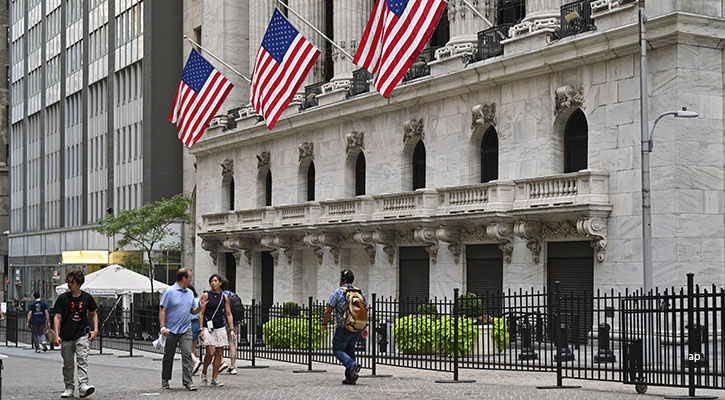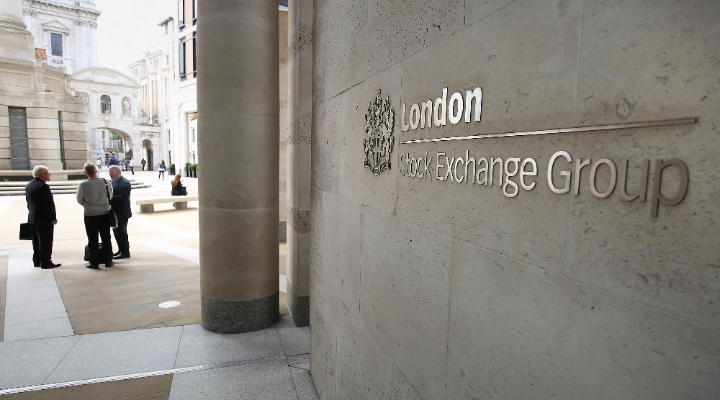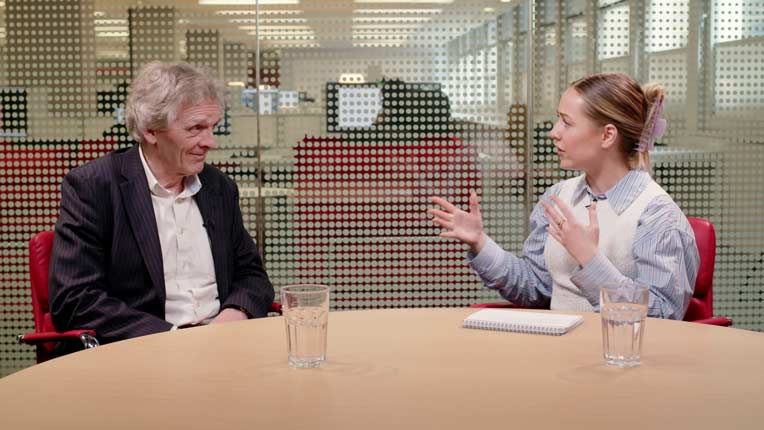
Every January we look back at how funds, exchange-traded funds (ETFs) and investment trusts have performed in the previous year. On Monday we looked at the best- and worst-performing open-ended funds of 2023, so now we're going to focus on the how closed-end funds under Morningstar coverage have done in what was a good year for markets overall.
Given the US stock market's strong performance in 2023, it's not a huge surprise to see a US-focused trust at the top of the leaderboard. The clear winner last year was JP Morgan American (JAM) with a near 25% share price gain, with Henderson European Focus Trust (HEFT) and FTSE 100 giant Scottish Mortgage (SMT) holding second and third.
JP Morgan is the only one in the 34-strong list to belong to the US Equity Large Cap Growth category, although large-cap trusts are well represented in the top 12: four belong to the Global Equity Large Cap category (Monks, Scottish Mortgage, F&C and Mid Wynd International) while two belong to the Europe Equity Large Cap category (HEFT and Fidelity European).
In basic terms, US large caps were the winners last year; it hasn't all been about US tech giants but it certainly felt that way news-wise; my US colleague Sarah Hansen argues 2024 could see a more broad-based rally as markets respond to potential central bank cuts.
Top-Performing Investment Trusts
Away from the predictable large-cap winners of 2023, there were some outliers, such Silver-rated TR Property (TRY), Bronze-rated Pacific Assets (PAC) and Silver-rated Schroder Asian Total Return (ATR). The first one produced a share price return of 10% despite some turbulence in the property sector, while PAC gained 8% and ATR rose 6.80% even as Asian equities struggled.
On that theme, the worst performer in our coverage was JPMorgan China Growth & Income (JCGI), which fell just over 37% in 2023 in share price terms. Asian Dragon, on which more below, was the next-worst performer.
Asia was a common theme among the year's laggards, including Schroder AsiaPacific (SDP), Baillie Gifford Japan (BGFD), Baillie Gifford Shin Nippon (BGS).
Should I Stick With Underperforming Japan Trusts?
You may be surprised to see Japan-focused trusts in the bottom 10. After all, the Nikkei 225 rose 30% in 2023 and the Topix index performed similarly. Indeed, JP Morgan Japanese (JFJ) is in the top 10 of trust performers with a 6% gain.
Trust managers tend to deviate significantly from the benchmark, however, and Japan is a country where active management is prized by investors for many reasons.
In previous years when the market has gone sideways – and many investors have had several lean years and false dawns backing Japan – trusts have managed to make positive (and real) returns. But 2023 was different. Perhaps it was a turning point, although much depends on currency and the Bank of Japan. A simple Japan ETF would have provided you some significant returns, even above those from the US market. Again, markets rarely repeat themselves neatly in subsequent years.
With Japan trusts, it's worth looking (by clicking on the tickers) at which stocks they hold and where the overlap with the indices is – a concept known as "active share". Managers can have a different size and style bias to the index too. The other obvious swing factor is currency: the Yen has been weak against rival currencies in recent years; a year ago £1 bought ¥159 and now that buys ¥183, a significant depreciation. A useful explainer on currency impacts on returns can be found in "Should Investors Panic About the Weak Pound?".
Should you stick with the 2023 underperforming Japan trusts? Baillie Gifford Japan has a Silver rating and Morningstar analyst Lena Tsymbaluk says "our conviction in the team and approach remains". She adds: "this strategy is all-cap, addressing the lack of sell-side analyst coverage lower down the market cap. The approach is benchmark-agnostic, focusing on identifying underappreciated long-term growth." The trust has outperformed the Topix index in the longer term too.
"We retain conviction in this strategy's potential to outperform over full market cycles," she continues.
"Given its style, it is expected to do well when the market pays attention to earnings growth but is likely to underperform when quality-growth and mid-cap companies are out of favour, as has been the case more recently."
Bronze-rated stablemate Baillie Gifford Shin Nippon (BGS) had a standout 2020 but has struggled in recent years. Again, Tsymbaluk explains this as down to its size and style focus:
"The fund has clear style biases toward high growth smaller areas of the market compared with the index, which has been largely responsible for the recent underperfomance." Given its volatility, she encourages investors to hold the trust for longer periods.
China Disappoints Again
2023 wasn't a great year for emerging markets either, and the performance of China has not helped. Gold-rated JPMorgan Emerging Markets (JMG) sneaks into the bottom 10 with a share price fall of just over 4%. This trust has India as the biggest weighting (24.77%) and 21.66% invested in China.
Emerging market investors now need a good year from China in 2024, and a revival there has been talked of for a few years now. There are signs of a thaw in relations between the US and China but a potential change of US President could shift the balance of power again. My colleague Kate Lin looks at the drivers of the Chinese stock market in 2024 in her recent outlook.
It's worth pausing to look at how rated trusts performed the year before. Some of 2023's biggest gainers were among the worst performers in 2022. Scottish Mortgage is one, having fallen by a hefty 45%. Top performers in one year, whether funds or trusts, often fail to match this in the subsequent year, a disappointment to investors trying to follow trends.
This was particularly stark last year as 2022's "risk-off" mindset was followed by the emphatic return of "risk on" sentiment for equities. Here we see Ruffer and Capital Gearing, numbers two and eight respectively in 2022, in the bottom 10 in 2023. On the flipside, Monks (33 out of 39 in 2022), TR Property (36 out of 39) and JP Morgan Japanese (34 out of 39) make it into the top 10 for last year.
What Are Investment Trusts?
There are plenty of general global growth trusts out there, with F&C, Witan and Alliance Trust all popular with retail investors. But trusts also allow niche exposure to sectors that open-ended funds would struggle to reach; recent innovations include airline leasing, music royalties and renewable energy storage.
Investment trusts trade at a discount or premium to their net asset values (NAV) and, unlike their open-ended counterparts, can use gearing (borrowing) to enhance returns.
Many are listed on the FTSE 250 with ample liquidity, while a handful are large enough to make it into the FTSE 100. Examples include Scottish Mortgage, Pershing Square Holdings, and F&C. Taking real estate investment trusts (REITs) into consideration, Land Securities is also in the FTSE 100, making four trusts in the blue-chip index.
Trusts are traded on the London Stock Exchange (LSE) like shares and are priced in real time. So it's easy to see how well a trust is performing on a daily basis – handy if you like to check how your portfolio is doing regularly.
Setting performance aside, it hasn't been a vintage year for investment trusts. Discounts are one way of measuring whether trusts are out of favour and they tell one part of the story.
Expect More Consolidation in 2024
Consolidation of smaller trusts is another, and we've seen a number of those announced in 2023: abrdn New Dawn, a top performer in the heyday of emerging markets, was wound up and taken over for £214 million by the Morningstar Bronze-rated Asia Dragon Trust (DGN). At the time of writing, the combined trust has a market capitalisation of over £500 million. For comparison, the biggest in the market is Scottish Mortgage Trust, valued at just over £10 billion valuation. It's followed by F&C with nearly £5 billion.
Another Morningstar-rated trust, Abrdn Japan (AJIT), was merged with Nippon Active Value Fund (NAVF), which is not rated by our analysts.
Methodology
35 UK investment trusts are assigned a Morningstar Medalist Rating of Neutral or above. We've chosen to measure the share price share to calculate performance; we've taken the closing price on the last day's trading in December and compared that with the closing price on the last trading day of 2023.
This may not be the perfect way of measuring performance, especially factoring in gearing, premiums/discounts, costs, dividends etc. But it reflects the reality of the average investor buying and holding a trust over and year and checking their portfolio for the annual gain at the end of the period. Also, an investor can quickly check the "live" price of their trust during market hours with a quick internet search. They would rarely calculate the change in the NAV, although this is often reported as part of a trust's results.
Investment trust share prices can trade above or below the underlying value of the portfolio's assets, leading to premiums and discounts to NAV, which are usually quoted in percentage terms. We've shown the premium/discounts in a separate column above.





























